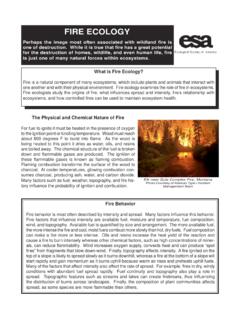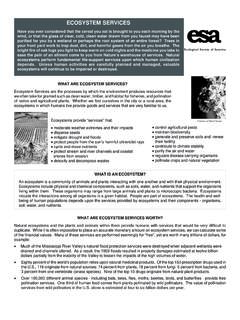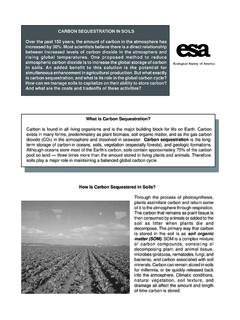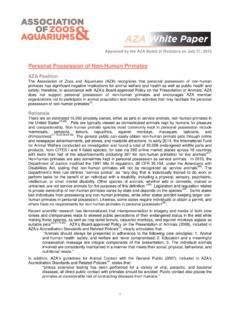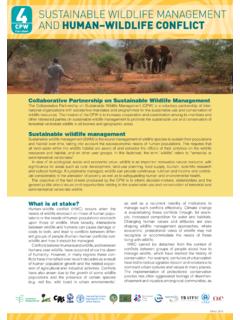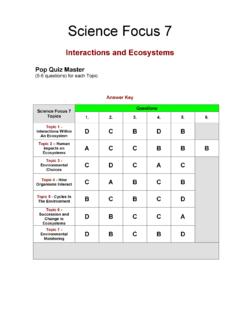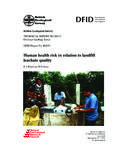Transcription of l ssues in Eco Published by the Ecological Society of ...
1 Published by the Ecological Society of America Number 2, Spring 1997 Ecosystem Services: BenefitsSupplied to human Societiesby Natural EcosystemsIssues in Ecology Issues in Ecology Number 2 Spring 19971 Ecosystem Services: benefits Supplied to HumanSocieties by Natural EcosystemsSUMMARYH uman societies derive many essential goods from natural ecosystems , including seafood, game animals, fodder,fuelwood, timber, and pharmaceutical products. These goods represent important and familiar parts of the has been less appreciated until recently is that natural ecosystems also perform fundamental life-support serviceswithout which human civilizations would cease to thrive.
2 These include the purification of air and water, detoxificationand decomposition of wastes, regulation of climate, regeneration of soil fertility, and production and maintenance ofbiodiversity, from which key ingredients of our agricultural, pharmaceutical, and industrial enterprises are derived. Thisarray of services is generated by a complex interplay of natural cycles powered by solar energy and operating across awide range of space and time scales. The process of waste disposal, for example, involves the life cycles of bacteria as wellas the planet-wide cycles of major chemical elements such as carbon and nitrogen. Such processes are worth manytrillions of dollars annually.
3 Yet because most of these benefits are not traded in economic markets, they carry no pricetags that could alert Society to changes in their supply or deterioration of underlying Ecological systems that generatethem. Because threats to these systems are increasing, there is a critical need for identification and monitoring ofecosystem services both locally and globally, and for the incorporation of their value into decision-making , the nature and value of Earth s life support systems have largely been ignored until their disruption orloss highlighted their importance. For example, deforestation has belatedly revealed the critical role forests serve inregulating the water cycle -- in particular, in mitigating floods, droughts, the erosive forces of wind and rain, and siltingof dams and irrigation canals.
4 Today, escalating impacts of human activities on forests, wetlands, and other naturalecosystems imperil the delivery of such services. The primary threats are land use changes that cause losses in biodiversityas well as disruption of carbon, nitrogen, and other biogeochemical cycles; human -caused invasions of exotic species;releases of toxic substances; possible rapid climate change; and depletion of stratospheric on available scientific evidence, we are certain that: Ecosystem services are essential to civilization. Ecosystem services operate on such a grand scale and in such intricate and little-explored ways that most could notbe replaced by technology.
5 human activities are already impairing the flow of ecosystem services on a large scale. If current trends continue, humanity will dramatically alter virtually all of Earth s remaining natural ecosystems withina few addition, based on current scientific evidence, we are confident that: Many of the human activities that modify or destroy natural ecosystems may cause deterioration of ecologicalservices whose value, in the long term, dwarfs the short-term economic benefits Society gains from those activities. Considered globally, very large numbers of species and populations are required to sustain ecosystem services. The functioning of many ecosystems could be restored if appropriate actions were taken in believe that land use and development policies should strive to achieve a balance between sustaining vitalecosystem services and pursuing the worthy short-term goals of economic Issues in Ecology Number 2 Spring 1997 Ecosystem Services: benefits Suppliedto human Societies by Natural EcosystemsbyGretchen C.
6 Daily, Susan Alexander, Paul R. Ehrlich,Larry Goulder, Jane Lubchenco, Pamela A. Matson, Harold A. Mooney,Sandra Postel, Stephen H. Schneider, David Tilman, George M. WoodwellINTRODUCTIONMany societies today have technological capa-bilities undreamed of in centuries past. Their citizenshave such a global command of resources that even foodsflown in fresh from all over the planet are taken forgranted, and daily menus are decoupled from the limita-tions of regional growing seasons and soils. These de-velopments have focused so much attention uponhuman-engineered and exotic sources of fulfillment thatthey divert attention from the local biological underpin-nings that remain essential to economic prosperity andother aspects of our biological underpinnings are encompassedin the phrase ecosystem services, which refers to a widerange of conditions and processes through which natu-ral ecosystems , and the species that are part of them,help sustain and fulfill human life.
7 These services main-tain biodiversity and the production of ecosystem goods,such as seafood, wild game, forage, timber, biomass fu-els, natural fibers, and many pharmaceuticals, industrialproducts, and their precursors. The harvest and trade ofthese goods represent important and familiar parts ofthe human economy. In addition to the production ofgoods, ecosystem services support life through (Holdrenand Ehrlich 1974; Ehrlich and Ehrlich 1981): purification of air and water. mitigation of droughts and floods. generation and preservation of soils and renewal oftheir fertility. detoxification and decomposition of wastes. pollination of crops and natural vegetation.
8 Dispersal of seeds. cycling and movement of nutrients. control of the vast majority of potential agriculturalpests. maintenance of biodiversity. protection of coastal shores from erosion by waves. protection from the sun s harmful ultraviolet rays. partial stabilization of climate. moderation of weather extremes and their impacts. provision of aesthetic beauty and intellectual stimu-lation that lift the human the distinction between natural and human -dominated ecosystems is becoming increasinglyblurred, we emphasize the natural end of the spectrum,for three related reasons. First, the services flowing fromnatural ecosystems are greatly undervalued by the most part, they are not traded in formal marketsand so do not send price signals that warn of changes intheir supply or condition.
9 Furthermore, few people areconscious of the role natural ecosystem services play inFigure 1-Aspen (Populus tremuloides)forest in Colorado, filtering and pu-rifying air and by J. Robert Stottlemeyer/Biological Photo Service3 Issues in Ecology Number 2 Spring 1997 Figure 2-Woman carrying treetrunk for boat-making in a fishing village on Chiloe Island, forests remain an important source ofwood for construction, fuel, and other by Taylor Rickettsgenerating those ecosystem goods that are traded in themarketplace. As a result, this lack of awareness helpsdrive the conversion of natural ecosystems tohuman-dominated systems ( , wheatlands or oil palmfields), whose economic value can be expressed, at leastin part, in standard currency.
10 The second reason to focuson natural ecosystems is that many human -initiated dis-ruptions of these systems -- such as introductions of ex-otic species, extinctions of native species, and alterationof the gaseous composition of the atmosphere throughfossil fuel burning -- are difficult or impossible to reverseon any time scale relevant to Society . Third, if awarenessis not increased and current trends continue, humanitywill dramatically alter Earth s remaining natural ecosys-tems within a few decades (Daily 1997a, b).The lack of attention to the vital role of naturalecosystem services is easy to understand. Humanity cameinto being after most ecosystem services had been inoperation for hundreds of millions to billions of services are so fundamental to life that they areeasy to take for granted, and so large in scale that it ishard to imagine that human activities could irreparablydisrupt them.


